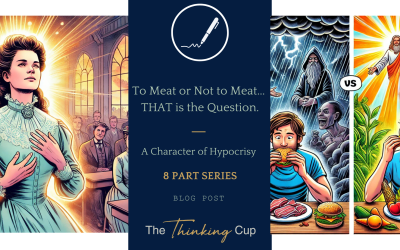The Ten Commandments are exclusively God’s eternal, inviolable, irrevocable, moral law that transcends all time and culture. They were written with God’s own finger on stone. They are a permanent, all-encompassing, stand-alone law because they were written on stone. They are distinct and separate from the ceremonial Law of Moses, which is written in the Book of the Law and placed at the side of the Ark of the Covenant. The ceremonial Law of Moses has been abolished, but the Ten Commandments remain to be kept by all. They are the transcript of God’s character and can never change.
(We must address this statement in several sections. Each section can be viewed independently of the others, but we must realize that this lengthy statement works together to form a framework for understanding and interpreting the law.)
———————————————
We are continuing our discussion today on one aspect of the Law and its connection to the assumed eternality of the Law. I believe this is an important discussion because how we interpret the Biblical text can lead one to think in ways about the law that aren’t upheld by the text.
I have heard a concept that has been tossed around in my discussions with other people.
The Ten Commandments were written with God’s own finger on stone.
It’s important to remember the larger context and logic when someone brings this statement into a discussion about the law. For some people, if the 10 Commandments were written with God’s own finger, then surely they are more important right?
Adventist teaching includes a lot of hype about the importance of the Law being written with the ‘finger of God.’ I always wondered where this came from, as there are only a few places in scripture that use this imagery:
- The incident with the Pharaoh’s magicians (Exodus 8:19)
- The Ten Commandments or the Two Tablets of Testimony (Exodus 31:18)
- Deuteronomy’s telling of the Re-giving of the Commandments (Deut. 9:10)
- Jesus explaining to the people how He was casting our Demons (Luke 11:20)
The last one, in Luke 11:20, is probably the most crucial narrative that conveys the overarching concept of what the ‘finger of God’ means. Notice that Luke isn’t trying to explain that Jesus was walking around with God’s literal finger and using it as a magical tool to cast out demons. The phrase ‘finger of God’ in this story provides the reader and those Jesus was speaking to the absolute authority behind his actions. Jesus could cast out demons because of the Authority of God, a.k.a. The ‘finger of God.’
Jesus is using a familiar figure of speech from the Old Testament. If you look at the other three verses that use this figure of speech, you can easily see that the authority being described is God’s. Anything that is said to be using the ‘finger of God’ is, by extension, claiming to have God’s authority behind it.
Tremper Longman III rightly points out that,
“The phrase ‘finger of God’ occurs as an indicator that an action comes from God and not some other source. In Luke 11:20 Jesus uses this expression to reinforce the idea that his ability to cast out demons is a product of God’s power rather than of the devil’s power. The phrase may also indicate effortlessness on God’s part. In Exod. 8:19 the phrase indicates that Pharaoh’s magicians know that the power displayed is from God and not a trick of Moses. Likewise, in Exod. 31:18 and Deut. 9:10 the phrase attributes the authorship of the Decalogue directly to God.” [1]
It would misrepresent the figure of speech to claim that because God’s finger wrote on the stone tablets, the Commandments are ETERNAL and BINDING on ALL HUMANITY. This is another example of the Adventist church interpreting the Bible through the lens of what Ellen White claimed.
“And he gave unto Moses, when he had made an end of communing with him upon Mount Sinai, two tables of testimony, tables of stone, written with the finger of God. There are abundant evidences of the immutability of God’s law. It was written with the finger of God, never to be obliterated, never to be destroyed. The tables of stone are hidden by God, to be produced in the great judgment-day, just as he wrote them.” [2]
She goes on to claim that because the ‘finger of God’ was used in the crafting of the commandments, then by extension, the Sabbath will be a test of loyalty for all humanity.
“The Sabbath has been the test of the loyalty of God’s people in all ages. ‘It is a sign between me and the children of Israel forever,’ the Lord declares.” [3]
How can one make those connections? This is a clear example of jumping to conclusions outside the Biblical text and narrative context. A sign or ‘mark’ was uniquely tied to covenants in the Old Testament. The Sabbath only means something inside the context of God’s covenant with them. If the Sabbath is a sign, then we should also note that the text says this sign was between Yahweh and the children of Israel. We are NOT the children of Israel, at least not in the sense that the author of Exodus was stating. This is an example of eisegesis, interpreting a text by expressing the interpreter’s own ideas, bias, or agendas rather than the meaning of the text.
Adventists claim that the Ten Commandments are natural moralistic laws because God wrote the Ten Commandments with his finger. They are woven into a human’s very being. This concept comes from the mind of Ellen White and doesn’t exist in the minds of the Biblical authors. In her book Evangelism, Ellen writes this:
“God has written His law upon every nerve and muscle, every fiber and function of the human body.” [4]
She goes on to describe specific things that would defile the body and, therefore, by extension, defile the temple of God and the law itself.
“This indulgence in any of the members of the human family is sin.” [5]
Really? Interestingly, the length to which Ellen White goes to push the law on people and these extreme applications extend further than how the Israelites would keep the law in the Old Testament. Ellen would have made an excellent Pharisee back in Jesus’ day. I wonder if Jesus would have looked at her and said, “Woe to you, scribes and Pharisees, hypocrites! For you are like whitewashed tombs, which outwardly appear beautiful, but within are full of dead people’s bones and all uncleanness. So, you also outwardly appear righteous to others, but within, you are full of hypocrisy and lawlessness. (Mt 23:27–28)”
Ellen White must have taken Matthew 5:20 out of context and thought we must keep the law even better than the Pharisees.
“For I tell you, unless your righteousness exceeds that of the scribes and Pharisees, you will never enter the kingdom of heaven.” (Mt 5:20.)
Jesus was not asking that we obey the law to such strict obedience that this would become the act that salvation was earned. He was showing the need for a more perfect Savior, one that kept the requirements of the law. He showed a different relationship to the law than the Scribes and Pharisees understood.
“Strict adherence to a religious code of conduct was not the legalism that Jesus and the apostles resisted. Rather, the problem was relying upon meritorious works either for salvation or the maintenance of one’s status among ‘the elect’ instead of having faith in God’s gracious, saving activity revealed in Jesus Christ (cf. Rom 9:30–33; 14:1–15:6).” [6]
As stated earlier, Adventists claim that these Ten Commandments are the Moral Law written into the very fiber of our beings. None of the Commandments are natural to all humans, let alone natural to God or a reflection of God’s character. The first four commandments are not naturally moralistic laws. They only take on moralistic overtones when entering a covenant relationship with Yahweh. Moralistic laws are inherent ought-nots. They are things that are ingrained in us by nature. They are the consciousness of knowing what should and should not be done. The consciousness of knowing good and evil (Gen 3:22). The first four commands of the Ten Commandments are not inherent to the human psyche and nature. Humans don’t know naturally that they shouldn’t make graven images of gods and they shouldn’t worship those images. In fact, in the Ancient Near Eastern context, we know that many nations did this very thing. It wasn’t built into their being that they would naturally understand that this was wrong for them.
In my next post, I’ll discuss whether the Ten Commandments, especially the Fourth Commandment (the Sabbath), are indeed God’s moral and eternal laws.
[1] Tremper Longman III, Peter Enns, and Mark Strauss, eds., The Baker Illustrated Bible Dictionary (Grand Rapids, MI: Baker Books, 2013), 591.
[2] The Review and Herald, n.d., 3987.
[3] The Review and Herald, n.d., 3987.
[4] Ellen Gould White, Evangelism (Review and Herald Publishing Association, 1946), 265–266.
[5] Ellen Gould White, Evangelism (Review and Herald Publishing Association, 1946), 266.
[6] Larry R. Helyer, Exploring Jewish Literature of the Second Temple Period : A Guide for New Testament Students (Downers Grove, IL: InterVarsity Press, 2002), 465–466.




There are two other instances with handwriting or writing with finger, in Daniel 5 and in John 8, both within the context of condemnation. Paul also uses the ten commandments within the same context in 2 Corinthians 3:6-9.